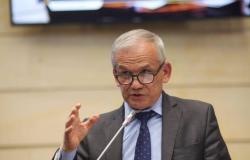One day after Claudia Sheinbaum won the presidential elections in Mexico, Miguel Mario Díaz-Canel Bermúdez announced through his X account that he had spoken by telephone with the president-elect and confirmed “the sympathy” he felt for her victory.
Likewise, Sheinbaum thanked the first secretary of the Central Committee of the Communist Party for the call and said that Mexico and Cuba were “sister nations, united by ties of cooperation, solidarity and shared history.”
The mutual sympathies and gratitude of the elected president of Mexico and Díaz-Canel are not unexpected. The election of Sheinbaum represents the continuity of the policies of Andrés Manuel López Obrador (AMLO) and Morena. A policy that, especially in matters of foreign relations, has favored the Cuban Government because it has deepened the ties between the Government of Mexico and the Communist Party regime.
But in concrete terms, what could Sheinbaum’s election mean for the island’s Administration?
1. Support for the rhetoric of sanctions as the cause of the Cuban crisis
Mexico has historically maintained a position against sanctions against Cuba. It was the only country that voted against the expulsion of Cuba from the Organization of American States (OAS) in 1962, which preceded the imposition of a system of multilateral sanctions against Castroism in 1964 promoted by the regional organization. The Government of Mexico at the time issued a special vote against the imposition of OAS sanctions and against the organization’s 1964 declaration.
However, the López Obrador and Morena Administration have taken historical positions to special levels. Not only has he opposed the sanctions, but the president has become a defender of the idea promoted by Cuban propaganda and bureaucracy that the “blockade” is the exclusive cause of the crisis in Cuba. Andrés Manuel López Obrador has described the US embargo as an inhuman, extreme and medieval policy and has defended the idea that the “US blockade” makes it difficult to purchase medicines from the communist regime.
López Obrador’s support for the Cuban Government – similar to what can be expected from Sheinbaum – even extended to his refusal to participate in the 2022 Summit of the Americas due to the non-invitation of Cuba, Nicaragua and Venezuela under the argument of US administration that “dictators should not be invited.”
López Obrador, in addition, two months after the repression unleashed by the Canel Government against the protesters on July 11, 2021, invited the Cuban president to the celebrations for Mexican Independence Day. On September 16, 2021, Díaz-Canel gave a speech at the official ceremony in Mexico City’s Zócalo and became the first foreign leader to do so. In February 2023, López Obrador awarded Canel the Mexican Order of the Aztec Eagle, the highest distinction awarded to foreigners.
2. Mexico has become an alternative oil supplier
Mexico has become an alternative supplier of oil for the Cuban Government. The exchanges have not been marked by the economic benefits that could mean for the Mexican side.
In 2023, the Mexican state Pemex, exported to Cuba 16,800 barrels of crude oil and 3,300 barrels of petroleum products per day. The exchange amounted to a figure close to 400 million dollars. However, the exchanges seem to respond to a more political than economic logic.
The Havana regime has been facing a general crisis for years. However, one of the most recurrent expressions of the crisis is the lack of fuels, which ends up having an impact on the country’s economy. The debacle of the Venezuelan oil industry, US sanctions and the productive inability of the island’s Government have considerably reduced access to the oil it needs. Given the situation, political agreements have come to play a fundamental role in the immediate solutions that the Cuban Administration has found to try to weather the storm.
As part of the political agreements, crude oil exports to Cuba from Mexico were resumed. At first, they were not a commercial exchange. In June 2023, Mexico donated 350,000 barrels of crude oil to Cuba and another 700,000 in July, marking its first exports to the island since 2019, when they had been stopped.
After the 2023 exchanges, crude oil prices skyrocketed in the international market and exports to Cuba interfered with the aspirations of Pemex—a company with certain financial difficulties—to access credit at EXIM Bank (official credit agency). to export from the United States). Given the scenario, the Mexican Secretary of Foreign Affairs, Alicia Bárcena, assured that they could “charge” Cuba for the donated oil.
But beyond the obstacles, what the Government of Mexico did was create mechanisms to favor Cuba without putting Pemex at risk. A document from the Mexican oil company published at the end of 2023 claimed that since July 2023, fuel exports to Cuba were carried out through Gasolina Bienestar, S. A. de C. V. (Sociedad Anónima de Capital Variable). It is a subsidiary of Pemex, wholly owned by the Mexican State, whose role is to acquire crude oil and derived products from some Pemex subsidiaries and then export them to Cuba, which avoids US sanctions.
Despite the replays, the inability of the Cuban regime to pay for the oil it needs led to the halting of exports from Mexico to the island in February 2024. However, once again Cuba faces an electricity generation crisis motivated above all by the lack of fuel and the AMLO Government, as a sign of its political commitment to Castroism, seems to will resume crude oil shipments to the island to help alleviate the crisis.
Few doubt that the same commitment that materialized during the AMLO Government will not be reproduced in that of the recently elected Claudia Sheinbaum.
3. Mexico is also a contractor for Cuban medical services
In 2023, there were more than 22,400 Cuban health collaborators in 59 countries, according to data of the Ministry of Public Health (Minsap). Of the total —until September 2023—, 806 They are on Mexican soil.
Since 2022, the Governments of Mexico and Cuba signed a medical collaboration agreement through which the presence of Cuban doctors in Aztec land has increased. Some consider that the hiring of Cuban health professionals, rather than covering a real need in Mexico, responds to the AMLO Government’s intentions to camouflage its financial support for Castroism.
The above is the position of Xóchitl Gálvez, who was Sheinbaum’s main contender in the Mexican presidential elections. During her presidential campaign, Gálvez assured that if elected she would not hire more Cuban doctors. The candidate said that “in Mexico what [sobraba era] capacity and talent and the bringing of Cuban doctors only [había] served to simulate the financing of an authoritarian regime.
The election of Sheinbaum keeps alive the hope of the Cuban Government to continue and—why not—deepen its medical collaboration agreement with Mexico. Health professionals have not only been a source of income for the Castro regime, but also a form of political influence in other States in the region.






